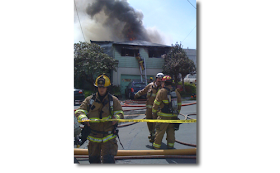
Not a grow-house fire in Trinidad, but it could be.
I look forward to Ken's reporting on this issue and researching it more myself. It is my understanding that if we don't have specific laws in Trinidad, they default to California State Laws. I'll find out and post the results here. In the mean-time, while I've supported lawful growing of cannabis, like any other lawful act, how do you feel about it? Arcata's Cannabis Standards, and Fortuna's Work seem like reasonable places to start. There is a good article in the November 25th issue of the Arcata Eye - by Kevin L. Hoover Vol. 13 No.8.
Online, I read a post that sums up a nice policy perspective we could implement right now.
"If you want to "save your neighborhood", actually meet up with your neighbors occasionally for a block party or something and organize a neighborhood watch." (anonymous, New York, NY -#21 June 3 2008). That's certainly seems better than suspicion, gossiping, spying on meters, and way better than illegally spray painting homes.
commenter idea:
"Or, landlords could capitalize on the growers. Advterise 215 friendly rentals, allready properly wired and constructed to handle and grow."
Smarter Than You, Redwood City, CA #14Sep 20, 2008[1]
While we started exploring the dispensary issue here in Trinidad last week, McK had an interesting business proposition. According to the Time-Standard, "The Rose Center would provide growers with an environmentally secure facility that would be run in accordance with Proposition 215, Senate Bill 420 and the Attorney General's 2008 guidelines for medical marijuana cultivation." From the article, it seems this would be a medical marijuana growing collective and "The Rose Center was not designed to be a dispensary and medical marijuana would not be given to patients at the site..." The applicants seem to want to create a facility that allows Proposition 215 card-holding growers to cultivate "... more than they need for their own purposes ..." in a commercial space.
I need more education on this, because I was under the impression that 215 was only for growing / buying what you need for your medical condition. Seems like if you grow more than you need, or want to grow it to help those who cannot, or grow it as a non-profit or for-profit business, it would make sense to allow and regulate that with laws, zoning, licensing and appropriate taxing. I'm leaning more towards simplifying regulation of the industry and generating revenue, than spending money and time on investigation and enforcing complicated use laws. That being said, the laws need to be changed to allow this, and current laws need to be respected.
I continue to explore all sides of this, so please continue to comment ...
Reference:
Times-Standard: McKinleyville 215 collective a no-go from the get-go (WebCite archive)
Someone brought up an alternative perspective to me today - love those they make me think more. Are these "busts" sticking or going to stick?
ReplyDeleteSo, are we spending our tight Police Budget on these, and getting what we are paying for? Are there other less expensive ways to discourage these hidden illegal grows, and maybe start generating some revenue from the legal, compassionate aspects of this local industry? Hmmmmm.
Another idea for landlords:
ReplyDeleteInclude the utilities [i.e. PGE] in
the monthly rental w/ the understanding
that the PGE invoice will go the the propety
owner. [Rather like water/garbage included
scenario].
Of course this would require a reasonable usage estimate of monthly kwh's to be established w/ a rental agreement & a threshold for unreasonable overusage of power. This might prevent in advance those planning on renting for 'grow house' purposes & othewise would
be a sure tip off if the landlord receives a
giant bill. Unusual tactic, but maybe worth
considering these days.